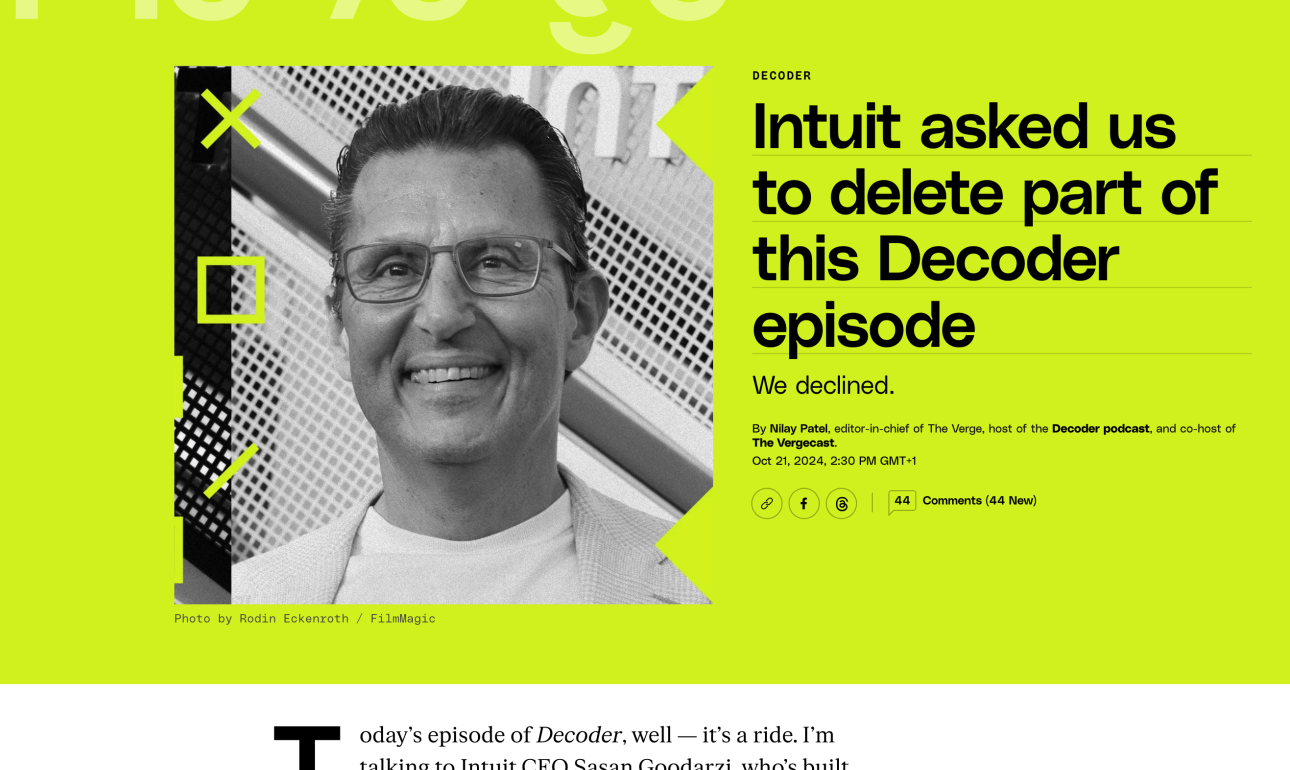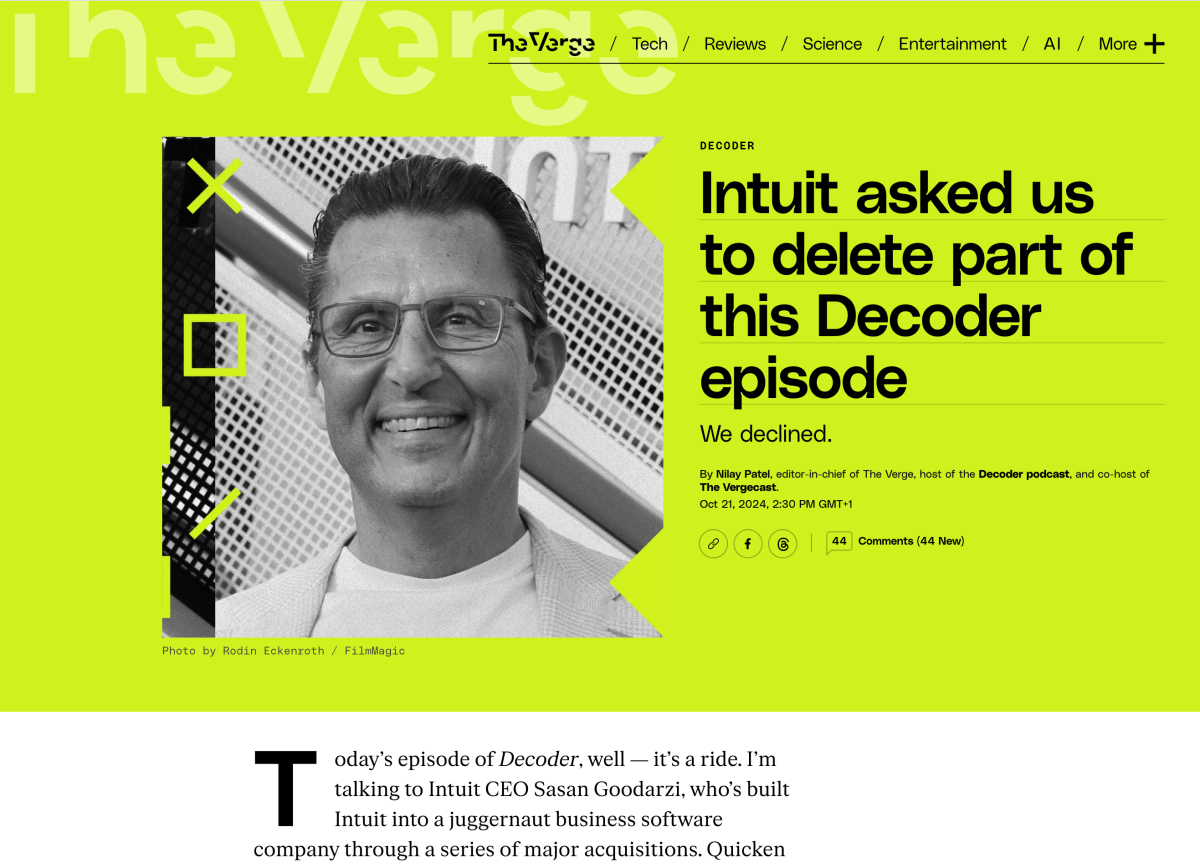
In October 2024, Intuit’s CEO Sasan Goodarzi participated in an interview on The Verge’s popular Decoder podcast. It was a wide-ranging chat in which he discussed various aspects of the company’s strategy, including AI integration in its financial products like TurboTax and QuickBooks, as well as sensitive topics like its relationship with the IRS.
So far, so good. The podcast has featured many of Silicon Valley’s leading lights, such as Meta’s Mark Zuckerberg and Google’s Sundar Pichai, and even former US President Barack Obama. It’s a great platform for discussing your company, and being interviewed by The Verge’s fearless editor-in-chief, Nilay Patel, is a prime way to cement your credibility as a tech leader.
However, a controversy erupted soon after Intuit requested that a segment of the interview be removed — specifically the portion discussing the IRS’s free tax filing service.
This decision turned what was likely a minor PR challenge into a much larger issue, exposing the risks that come with trying to control public narratives in a heavy-handed manner. Now only did the podcast’s title, summary, and accompanying article become about this failed attempt at removing the content, but the offending part of the interview was shifted to the beginning of the podcast itself – Patel and his team making a very deliberate point by doing so.
This is the article page:

Ouch.
The interview was published on the day that I’m writing this blog, so it’s unclear exactly how big the fallout will be, but it’s already very clear that it won’t be good for Intuit. This is especially bizarre, as Goodarzi answers Nilay’s contested questions fairly well, even if not entirely satisfactorily. But for the intervention, it would likely have raised very few eyebrows.
So, what can we learn from this highly regrettable incident about corporate communications and censorship? Here are the key takeaways:
1. Transparency Builds Trust
At the heart of the Intuit controversy lies a fundamental truth of modern communications: transparency is critical. In an era where consumers are more informed and connected than ever, any attempt to withhold or manipulate information will likely be viewed with suspicion.
When Intuit asked for portions of the interview to be edited out, it immediately raised eyebrows, drawing attention to the very topics they may have wanted to avoid. As a result, the company’s attempt to manage the narrative backfired, leading to negative press coverage and damaging its reputation. This was all entirely avoidable.
In contrast, being transparent — even about challenging issues — often works in a company’s favour. Transparency builds trust with the public and shows that the company is willing to engage in honest discussions, even when the subject matter is complex or controversial. As mentioned above, this is what Goodarzi was doing during the course of the interview itself, and in doing so he was able to convey Intuit’s perspective to a large audience articulately.
By trying to suppress certain parts of the conversation after the fact, Intuit sent the message that they had something to hide, which can be far more damaging than any challenging topic discussed openly.
2. The Dangers of Censorship
Censorship in any form is a delicate issue, particularly in corporate communications. Trying to alter or retract statements after they’ve been made public often leads to more scrutiny than the original content itself. In Intuit’s case, their request to remove a portion of the interview not only amplified attention to the censored topic but also triggered concerns about corporate accountability and freedom of speech.
This event echoes broader concerns about corporate censorship in the digital age. With the rise of social media and widespread access to information, any attempt to withhold or manipulate content is more likely to be noticed and criticised. Companies that try to control narratives too tightly can quickly find themselves at the centre of a backlash, as Intuit did. Moreover, in an age of data leaks, transparency is often seen as a more sustainable and effective strategy than attempting to suppress information that may eventually come to light.
3. Missed Opportunity for Proactive Engagement
Another aspect of the Intuit controversy is the missed opportunity for proactive communication. The topics discussed — including AI integration in financial services and the IRS’s free tax filing initiative — are significant issues that affect millions of people. Instead of viewing this as a potential PR liability, Intuit could have seized the moment to lead the conversation and clarify its stance.
Proactively addressing public concerns is a powerful way for companies to position themselves as leaders in their industry. By openly engaging with the concerns raised during the interview, Intuit could have shown that they are ready to participate in difficult but necessary conversations. For example, a follow-up blog post, public statement, or even a new segment addressing the IRS filing issue could have reframed the situation, presenting Intuit as a transparent and customer-centric company. Instead, the focus shifted to what the company wanted to hide, rather than what it wanted to highlight.
4. The Role of AI and Ethical Concerns
One of the more significant elements of the discussion — both the interview itself and the subsequent fallout — is the role of AI in financial services. AI is transforming industries, and its implementation in tax software like TurboTax or QuickBooks carries profound implications for users. However, along with the promises of efficiency and improved accuracy, AI also brings ethical concerns, especially when it comes to managing sensitive financial data.
By attempting to censor the discussion on AI and its implications for services like tax filing, Intuit missed the chance to engage in an important conversation about the future of AI in the industry. Consumers are increasingly aware of the potential risks and benefits of AI, and addressing these concerns head-on can help companies gain credibility and trust. For Intuit, this was a lost opportunity to demonstrate leadership and transparency in a rapidly evolving space.
5. Public Relations in the Digital Age
The Intuit interview controversy highlights a broader issue faced by companies today: the difficulty of controlling narratives in a digital world. Once information is out there, it’s nearly impossible to retract or suppress it without facing significant pushback. The age of delete and forget is long gone, and companies must adapt their communications strategies accordingly.
Instead of relying on censorship or heavy-handed control, companies should focus on engagement and openness. Addressing issues before they become crises, offering clarifications, and embracing difficult conversations can help companies avoid the pitfalls of censorship while building stronger relationships with their audiences.
Conclusion
The Intuit incident is a textbook example of how not to handle public communications in the digital era. Censorship, particularly after the fact, is more likely to damage a company’s reputation than help it. By embracing transparency, being proactive, and engaging with public concerns, companies can avoid the same mistakes and build stronger, more authentic connections with their customers.
The lesson here is clear: when it comes to communications, openness and honesty are always the best policy. Fighting against this risks putting you in the harsh glare of the media spotlight, and inflaming what could be a minor talking point into a major news story.